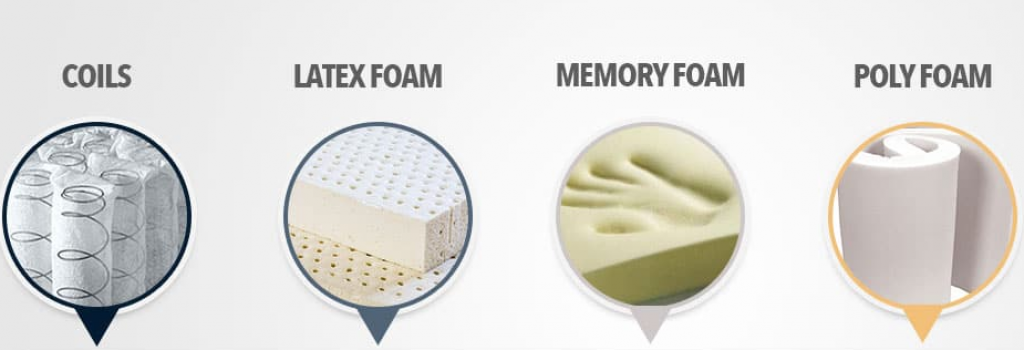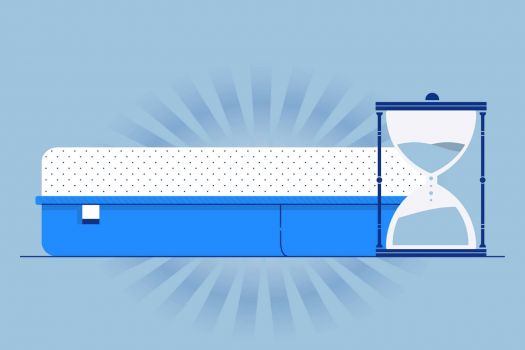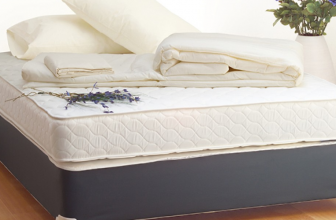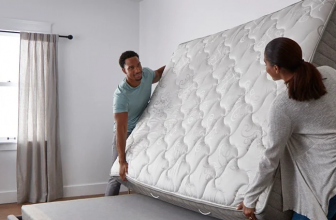Brief: How Long Does A Mattress Last
- Average Lifespan:
- Mattresses typically last 7-10 years. Lifespan depends on various factors, not just age.
- Factors Influencing Lifespan:
- Materials: Durability varies with materials like foam, latex, and polyurethane.
- Quality: Initial quality impacts longevity.
- Type: Different types (e.g., pillow top, innerspring) have varying lifespans.
- Sleep Position & Body Weight: Affect wear and mattress condition.
- Care & Maintenance: Regular care extends lifespan.
- Care & Maintenance Tips:
- Rotate regularly for even wear.
- Use a mattress protector to prevent stains and pest infestation.
- Keep the mattress dry and clean.
- Signs to Replace a Mattress:
- Sagging indicates failing support.
- Persistent body aches suggest inadequate support.
- Visible wear and tear.
- Allergies or asthma aggravated by the mattress.
- Presence of mold.
- Prolonging Mattress Life:
- Maintain a dry, clean environment.
- Regular vacuuming and spill management.
- Rotate and flip every three months.
- FAQs:
- Replacement Frequency: Every 8-10 years.
- Care Guidelines: Rotate every 3-6 months, use a mattress protector, and clean regularly.
- Flipping Frequency: Every three to six months for even wear.
A mattress lasts an average of 7-10 years, but it’s not always due to the mattress’s age when it is time to replace it. Many factors come into play, such as the type of materials used, your sleep position and body weight, your care routine for the mattress, and more.
So if you find yourself regularly waking with a sore back or achy joints, then it might be time to consider replacing your mattress. Even if you had initially intended on keeping it around for a long time, there was probably something that changed in your life that has put you over the edge.

In particular, many people these days are starting to notice that even though their mattress is the same or similar to one they had at least ten years ago, it has changed considerably. For example, back in the day, a person would be more likely to notice if the mattress they were using was truly comfortable and supportive. Today, some manufacturers practically have to add excruciatingly uncomfortable foam-like materials for people to buy their products.
Factors Influencing Mattress Lifespan
While there is no exact way to determine what particular factors affect a mattress’s lifespan, some things generally stand out. One thing that can affect the lifespan of a mattress is the materials used for it. For instance, if you treat your bed right, it will last about 7-10 years, whereas if you don’t take proper care of it, it could be five years or even less.
Materials
The materials in mattresses are among the things which can affect their overall durability and how long they last for – this means they can range from foam to latex to polyurethane to memory foam, depending on what you’re looking for in a mattress.

Foam is typically used for the base and the top layer of a mattress, with most beds consisting of 3-4 foam layers used in their construction. However, the density of these layers can be different in different mattresses, so you must know what you’re paying for.
The same goes for latex, although it’s not as expected, and it tends to be higher quality than foam regarding support. Polyurethane is also a popular material found in mattresses. Still, this material does not sink as quickly, so if you are a heavier person, this type of mattress might do well.
Original Quality
There are plenty of places to buy a mattress these days, with the most common being online and in stores. When you buy a product at a store, you can see exactly what you’re getting, whereas when you buy online, you can’t. For this reason, you must do your research before purchasing an item online, no matter how reputable the company is.
Even if they are known for having top-quality products, you don’t want to end up with something that has been stripped of its value by the materials they used. And if you’re going to buy a mattress online, then make sure it is from a good company because terrible products can ruin even the best materials.
Mattress Type
Another factor that can affect your mattress’s lifespan is the type of mattress you have. For example, in general, mattresses last longer than box springs when it comes to quality and comfort, so use this information to your advantage when looking for a new bed frame. Also, keep in mind that depending on whether you are looking at a pillow top or a non-pillow top, you should get a different type of bed frame as well.

Sleep Position & Body Weight
Sleep position and body weight can also have a significant impact on how long your mattress will last. Sleeping in the same position for years can worsen the condition of the bed, press it, and make its surface sag. Body weight also plays a great role in a mattress’s lifespan. The more you weigh, the less your mattress will last.

Care & Maintenance
And finally, how long a mattress lasts can depend on its care and maintenance. By taking proper care of your bed, you can ensure it has a longer lifespan than if you took poor care of it.
For example, experts recommend rotating your mattress regularly, which means turning it over so that the mattress bed gets more exposure to sunlight than the bottom side. This helps to break down chemicals and odors that might otherwise be trapped in your mattress and increase support and help minimize the breakdowns of beds.

Another thing to keep in mind is that you should always use a mattress protector or cover to help protect your mattress. This will prevent stains from forming on the mattress and keep pests such as bed bugs out of it, and it can hold dust mites from nesting in the mattress, which causes skin irritation.
When To Replace A Mattress
Even though you might not think that a mattress is broken when you notice it has a small tear in the cover or some indentations on the surface, it is time to replace it. This is because these issues can potentially cause problems with your body and cause health issues from bed bugs to allergies.
So if you notice any minor problems, then it’s best to replace your mattress regardless of whether the damage is minor or large. Below are the main issues that will inform you when it’s time to replace the mattress.
Sagging
If you notice that your mattress has sagged, then this is a sign that the support system inside of the bed is failing. If you feel that your mattress is sagging, then flip it upside down, roll it back over, and make sure that it is firm yet comfortable. Otherwise, it’s time for new mattress shopping.

Body Aches
If your mattress is giving you neck or back pain regularly, then it might be time to replace it with a new bed. Your old mattress most likely has developed some sort of indentation or some wear and tear, which has caused the way your body moves while you sleep to change so that it does not support you in the same way.

This can cause neck and back pain which can be bad for your health. Also, if your mattress is giving you aches and pains when sleeping, then it is possible that the bed frame is not strong enough to support the weight of your body, even though it should be able to support whatever amount of weight you might put on it.
Wear And Tear
Wear and tear is a big problem that most mattresses eventually have to deal with. Even if you do not notice it, your bed likely has some form of indentation or lining, which was once smooth but has become worn out over time.
If you feel that your indentations are not comfortable when you sleep, then it’s time to replace your mattress since it will create more problems for you and put your health at risk.
Allergy Or Asthma
Mattresses can be an issue for people with allergies or asthma. Mattresses may be filled with dust mites, feathers, and other substances that can cause allergies or asthma in people who have them. If you think you are allergic to mattresses, then it is possible to get rid of the problem by looking for a mattress made completely from hypoallergenic materials.
Mold
Mold can be a problem for people that do not have allergies or asthma but are sensitive to the chemicals in mold. Molds can cause an outbreak of asthma and allergies due to the chemical properties of the molds. The safest path to go with is always going with a mattress that is made from hypoallergenic materials.
How To Prolong The Life Of Your Mattress
One of the best ways to prolong the life of your mattress is to make sure that it remains in a dry and clean environment. Moisture can cause mold and mildew to grow on the bed, which can cause the release of foul odors and be unhealthy for those sleeping on the mattress.

Regular vacuuming of any dirt or debris is essential, along with not allowing water to come in contact with your mattress. If you have a spillage on your bed, make sure you immediately remove any moisture so that mold does not get started. Turning and rotating your mattress every three months is also an excellent way to prolong life since you will be rotating and fluffing up the foam or springs.
FAQ
How long does a mattress last?
It depends on the quality of the mattress, but typically, a high-quality mattress can last anywhere from 8 to 10 years.
How often should a mattress be replaced?
It is recommended to replace a mattress every 8-10 years. Signs that it is time to replace a mattress include sagging, unevenness, or decreased comfort.
What is the best way to care for a mattress?
To ensure a long lifespan for your mattress, it is essential to care for it properly. This includes regularly rotating your mattress (every 3-6 months), using a mattress protector, and cleaning the surface of your mattress.
How often should a mattress be flipped?
It is recommended to flip and rotate your mattress every three to six months to help reduce wear and tear.
You may want to revisit some parts of the article








